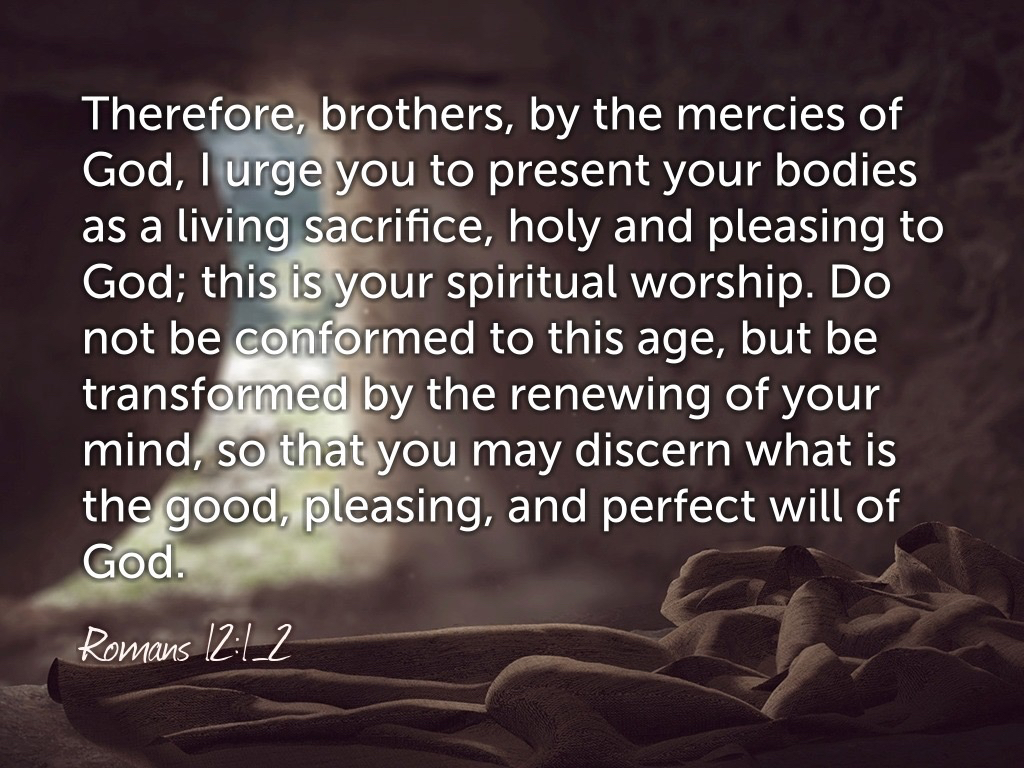Therefore, I urge you, brothers and sisters, in view of God’s mercy, to offer your bodies as a living sacrifice, holy and pleasing to God—this is your true and proper worship. 2 Do not conform to the pattern of this world, but be transformed by the renewing of your mind. Then you will be able to test and approve what God’s will is—his good, pleasing, and perfect will.

Introduction
The book of Romans is one of the most popular (if not the most popular) of Paul’s epistles. It was the discovery of Paul’s teachings about the righteousness of God in this book that marked a significant change in Luther’s life and started the reformation. Later on, he would refer to Romans 3:21-26 as the “chief point, and the very central place of the Epistle, and of the whole bible.” It is not uncommon to see preachers spend years expounding the book of Romans to their congregations.
One reason for its popularity is that Romans constitute the most comprehensive systematizing of the gospel, which is the center of the Christian faith. Since the gospel is the center of the Christina faith, it is not strange that a book, which gives the most comprehensive explanation and exposition of it, will have a place of special importance amongst believers.

The Background
Paul began his exposition of the gospel by establishing the sinfulness of man – Jews and Gentiles (Romans 1-3). The Jews who are with the law and the gentiles who are without the law stand condemned before the holy God. The natural revelation of God to the gentiles is sufficient to condemn them (Romans 1:18-21). In the same manner, the Jews who are circumcised and who possess the law are lawbreakers (2:17-30). Even though they have advantages flowing from their covenantal relationship with God (3:1), it is only those who have the inward circumcision and obey the law of God that are the true Israelites. In short, Jews and Gentiles are alike under sin. (3:10-18).
No one can be declared righteous before God by observing the law. All men are alike guilty and stand condemned under God’s righteous judgments. But the message of the gospel is that God has provided a way of righteousness that is apart from the law-covenant, even though the law-covenant anticipates and prophesied about it (Romans 3:21). This righteousness comes through faith in the atoning work of Christ. Through Christ’s death, God can be just and still be the justifier of those who have faith in Christ. The righteousness that Christ offers is perfect righteousness, and all those who partake of it (through faith) are justified before God. Christ had paid the penalty for the sins of all of his elect and imputed his perfect righteousness to their accounts so that they stand without condemnation and with perfect righteousness (the righteousness of Christ)
The kind of faith that appropriates this righteousness is a living faith, the type of faith that Abraham had in God when he received the Abrahamic covenant (Romans 4:3). Just as Abraham had faith and it was counted to him as righteousness, those who trust the God who justifies the wicked (via the substitutionary atonement of Christ) will have their faith credited to them as righteousness. (Romans 4:4-5). Whether Jew or Gentile, everyone who exercises faith in Christ, as Abraham had in God, will have the righteousness of Christ imputed to him or her.

The righteousness of God imputed to us is the basis of our justification before God. While this justification is a legal declaration, it comes with great blessings. By virtue of our justification, we have peace with God (5:1), access to God (5:2), the hope of glory (5:2), and preparation for that glory (5:3-5). Through Christ’s death (the demonstration of God’s love), we have been reconciled back to God. (5:6-11)
By his death, Christ has undone the work of Adam. He is the new Adam, the second Adam, who stands where Adam failed brought life where he brought dead, and justification where he brought condemnation (5:12-21). Through Adam’s one act of disobedience, many were made sinners, and many died (19, 15); in contrast, through Christ, the second Adam, many receive God’s grace, justification, the gift of righteousness, and eternal life (12-21). Those who are in union with Christ partake of all the grace that came through his life, death, and resurrection. They are no longer slaves to sin but righteousness. They are dead to sin and alive to God (Romans 6). They are no longer under the law, but they live through, and by the Spirit, and in that way, they fulfill the righteous requirements of the law (Romans 7, 8). The Spirit is the down payment of the glories to come in the fullness of the new creation. Those who are in Christ are under the sovereign care of God. The one who knew (loved) them from all eternity is the one who calls them, justifies them, and glorifies them. Rooted in God’s sovereign purpose, they can live with confidence in the face of guilt, fears, cares, etc. (Romans 8:18-39)
The glory of the gospel is rooted in God’s sovereign election and divine purposes (Romans 9). Jews and Gentiles must come based on faith. Jews who pursue righteousness by law did (do) not find it, and gentiles who pursue it by faith did (do) find it. (Romans 10) Though multitudes of Jews reject the gospel, that is no failure in God’s purpose since even in the old covenant, not all who are Israel are of Israel. God has not rejected the Jews. A large number of them will come to Christ and pursue the righteousness that is by faith (and by no other means). The fullness of the gentiles will make them jealous, and in turn, they will turn to God through Christ, united with the gentiles in the single vine. (Romans 11)
Given the glories of the gospel, our union with Christ, and all that is ours because of that union, how then should we live? In his systematic approach, Paul turns to this question in the next chapter (chapter 12)

Living in view of God’s Mercy: The Foundation of Christian Sanctification
Paul begins in verse 1 by urging us based on what has preceded – in view of God’s mercies (NIV, ISV) / by God’s mercies (KJV, NET). The foundation of what Paul will say in the following verses is the mercies of God.
First, that means that Romans 12 is the direct consequence or implication of what has gone before. In essence, if we ask Paul, how then shall we live in view of the gospel, his answer is what follows. The gospel has commands (Mathew 28:19, 20), it has urges (Romans 15:30), it has threats (Hebrews 6:4-6), and it has appeals (1 Corinthians 1:10). We are to delight and rejoice in the glories of the gospel, but if our rejoicing and delight in the gospel are biblical, it will include the commands, urges, appeals, and threats.
The gospel has commands (Mathew 28:19, 20), it has urges (Romans 15:30), it has threats (Hebrews 6:4-6), and it has appeals (1 Corinthians 1:10). We are to delight and rejoice in the glories of the gospel, but if our rejoicing and delight in the… Share on XSecond, Paul makes the point that Christian sanctification is rooted in justification. The appeal must not precede the mercies. The only people called to live the life that Paul will highlight are those who are justified. Those who Paul urges in this verse are brothers (brethren) – believers. It is an appeal to all those who, through faith, have been united with Christ. It is for those who have come to experience the realities of God’s mercy.
Without a firm grasp of the mercies of God and a delightful experience of it, it is impossible to live the Christian life. The call of Paul is to all those who are trusting in Christ’s perfect righteousness, and as a result, they have the assurance and confidence that there is no condemnation for those who are in Christ Jesus (Romans 8:1).
Without a firm grasp of the mercies of God and a delightful experience of it, it is impossible to live the Christian life. Share on XAs believers, we do not approach sanctification from the position of uncertainty or works righteousness. We must approach it from the position of a strong sense of justification, reconciliation, and adoption. We approach sanctification with the conviction that the basis of our justification, righteousness, and eternal life is the doing and dying of Christ (Romans 5:12-21). That work is perfect and complete. It is finished. We can neither add to it nor subtract from it. (Hebrews 10:10, 14). Stated another way, those who will not have sin as their master, are those who are not under the law but under grace (Romans 6:14)
As believers, we do not approach sanctification from the position of uncertainty or works righteousness. We must approach it from the position of a strong sense of justification, reconciliation, and adoption. We approach sanctification with the… Share on XHow, then, should justified, adopted, secured, assured, glorified believers live?
Stay Tuned.


